Right to work checks – how to avoid jail and a £20,000 fine
Yes, you’ve guessed it, Right to Work checks are about to get (more) serious
Our clients all know (because we’ve told them) that carrying out thorough checks on a new recruit’s right to work in the UK is absolutely essential. We also appreciate that, sometimes, parts of the process can easily be overlooked because, yes, we’re all busy and when we want someone to start work with us … we really want them to start as soon as possible.
This is when shortcuts are taken or we allow someone to start before all the checks are complete. It’s easy to see right to work checks as just more bureaucracy … more red tape but it’s important to realise the implications of not getting things right.
A five year stretch?
New proposals in the Immigration Bill 2015/16, currently progressing through Parliament, increase the burden of responsibility on employers to ensure the UK status of those they employ.
Currently, as an employer you have a statutory obligation to prevent illegal working by carrying out document checks on your employees’ right to work in the UK. Failing to do so can land you with a £20,000 civil penalty and, in some circumstances, a criminal conviction.
With the new Bill the consequences for employing illegal workers will be more severe, for example, the maximum prison sentence for an employer’s criminal conviction increases from two to five years. This is serious!
The Bill, which could be law by Summer 2016, will mean changes to the checking regime so you should start preparing now.
Partial right to work checks will no longer be considered mitigating circumstances (they were previously); so checking and copying documents correctly is now more important than ever.
What should you be doing?
Check your recruitment and selection policy, in particular, the process you follow when checking candidates Right to Work in the UK.
Some points to include:
- ensure that all initial right to work checks are carried out prior to new staff commencing work
- record the date on which a check was carried out (on the photocopied document(s) and/or HR system)
- make follow-up checks at the correct time
- carry out the additional checks required if the employee is a student with work restrictions
- obtain, copy and retain details of the student’s academic term and vacation times to ascertain independently when it is that a student can work full time
- retain evidence of checks during employment and for 2 years after termination
- retain copies in a secure manner (you should indicate where e.g. in a locked cabinet in a locked room/HR office/Manager’s office)
- ensure photocopies of documents are clear and complete
This new advice should be incorporated into your recruitment procedure and is in addition to your existing guidance on what documents to check and how to check them.
Ask yourself:
- What am I supposed to check?
- What documents can I accept?
- Do I really know what to look for?
- How will I recognise a fake passport?
- Do I need to see the originals?
- What part of the documents should I photocopy?
If you’re not sure of the answers, contact us to find out what you need to do to ensure your Right to Work checking procedure will meet the new requirements.
